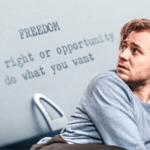“Most people do not really want freedom, because freedom involves responsibility, and most people are frightened of responsibility.”
Sigmund Freud, Civilization and Its Discontents
What would our world be like, (including our homes, schools and places of business) if everyone were firm (stating expectations directly and making straightforward requests) and respectful, delivering these in caring, thoughtful ways? And what if everyone experienced the broadest freedom possible (to innovate, speak up, share opinions, ideas, and feelings, and seek opportunities) with a strong sense of responsibility too?
When my kids were young, I wanted to provide firm and steady guidance without using coercion, guilt, fear or force. I wanted each to become a good citizen who cared about the happiness of all, while remaining authentic. I wanted each to realize that along with freedom they must shoulder responsibility too. Freedom without responsibility breeds anarchy and responsibility without freedom breeds loss of joy, and internal motivation. I knew a better way was possible but had to seek out relatively unconventional models in order to accomplish all of this. The following description of a YouTube video is a great example of how this looks. (Click here to watch this amazing video!)
In it, a young boy is engaged in a martial arts test, attempting to use his left hand to break a board. During his test, his master teacher tells him that he is pulling his punches. He says, “Dig deeper son, you’re pulling your punches. You’re holding back. I don’t know if you’re facing fear right now, but you’re holding back.” As the boy proceeds to try again, he begins to cry and his master gently says, “Son, why are you crying? It’s ok to cry. It’s called a test for a reason. Why are you crying?” The boy replies, “It hurts more to punch with my left hand.” The master replies, “Good. Let’s get at that. Yes, sometimes you will encounter discomfort and pain and you will want to resist and give up. That’s when you need mental fortitude even more than physical strength. It’s ok to cry. I cry a lot too. When you do, then you can name your feelings and understand them, and then you can set them aside to achieve your goal. Always dig deeper.” (Click here to watch this amazing video!)
I love this story because several important things occur that reflect our leadership development model at LifeWork Systems. In this type of model, you can be a good parent AND a friend, you can be a good boss AND a friend, etc. That’s because just as depicted in this video, we help leaders to also ensure power-within for all (not power-over or power-under) through the following:
- Expectations remain high throughout every event and communication.
- The leader stays consistently connected, compassionate and supportive.
- No shaming, force, guilt or other forms of power-over are used despite size, age, position or title.
- No rescue, exemption, enabling, or sugar-coating occur.
- Feelings and their expression are encouraged, accepted, examined for understanding, but not given undue attention or allowed as a means to avoid responsibility.
- The leader remains in a supportive role until an excellent outcome is realized.
- Recognition and acknowledgment are warmly and abundantly provided.
My work is helping all people understand and employ and embody effective transfer of responsibility to others in firm but purposeful, mutually respectful ways, no matter what. Let me know if I can help you or your organization so you can enjoy and develop fully engaged, caring and collaborative people. Now, more than ever, we need to have practical applications of mutual trust and respect. We are in a period of great unrest and experiencing gaps between races, genders, ages, and more.
This article was published in the column The Extraordinary Workplace in the St. Louis Small Business Monthly, November 2016




